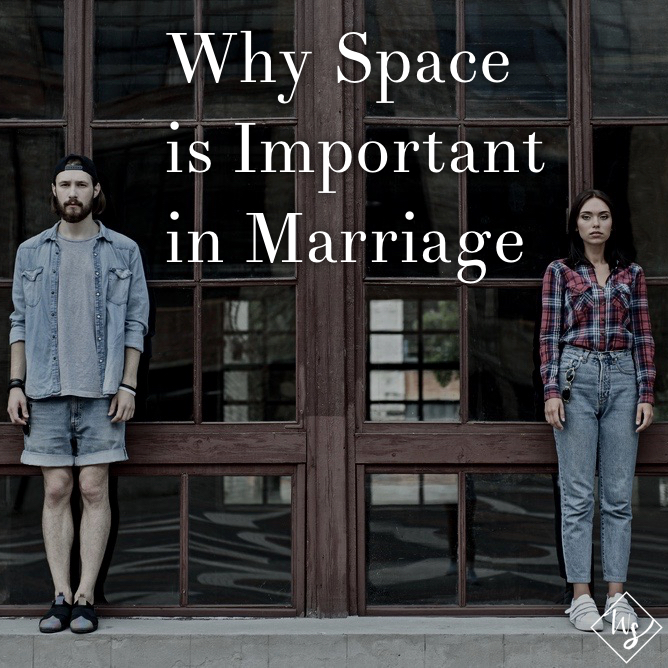What’s the first thing that comes to your mind when I say “space” in the context of marriage? Do you think of space in your schedule? Emotional space? Physical space in your home? We could take the space topic in a hundred different directions, and in the future we might, but for this article, we’re going to stick to the most material conversation: physical space, specifically in your home.
Let me begin by saying that my love languages are quality time and physical touch, both of which require my husband to be present. To say that we spend a lot of time together would be an understatement. I just did some quick math, and I estimate that we spend about 82% of our waking hours together. We both work from home, and we volunteer together almost every weekend. That’s a lot of time…even for this quality time, physical touch lover.
For a lot of couples, the issue is that they don’t get enough time together. They don’t think they need advice about maintaining their individual, physical space, instead, they need help making more time for each other. I would argue that the two aren’t mutually exclusive: It doesn’t matter how much time you spend together, becoming aware of the role physical space plays in your marriage dynamic is important.
So, all of that said, let’s talk about the ways that the physical space is important in marriage.
Create your own physical space in your home. There’s always that one seat in the living room that’s superior to the rest. It gets the most natural light, there’s plenty of surface space to set books and drinks, and it’s overwhelmingly comfortable. Whether you’re aware of it or not, you and your partner are constantly battling for the seat. You do your best to get there first in the evenings after work, or you save it with a cup of coffee first thing in the morning…the seat is worth the effort. If this is the case in your home, then you know that “the seat” can also be a source of tension. This tension might have resulted in external arguments or internal resentment, but either way, it’s not good for you. You have more important things to argue about.
The best solution is to create two equally-superior seats in your space, and then to make each seat cater to the primary sitter. If your partner likes to kick his or her feet up, get a footstool or a recliner. If you need more surface space for your stack of books and assorted beverages, accommodate them. If you’re newly married, this might sound excessive, but if you’ve experienced the struggle before, you know just how real it is.
Spend time physically apart. Spare time poses a perplexing problem in new marriage: How should you spend it? How many hours are required for a proper “settling in” to your new home/family setup? A lot of newlyweds enjoy spending every moment together, at least for the first few months. But as time goes on, the importance of spending time apart will become more and more obvious. Unfortunately, some couples don’t realize how important it is until it’s too late—”I believe I’ve had enough of you” is a difficult thought to admit and then to resolve.
The good news is that you can form habits that’ll prevent you from getting to this point, but you’d have to be aware that they’re necessary in order to form them. The better news is that most of us feel this way at some point in our marriage no matter what we do. So, in addition to spending good, quality time with your partner, make plans without him/her. Get dinner with friends, and enjoy updating your partner on the happenings of your social circle when you get home. If you don’t see the importance in this practice now, keep it in the back of your mind because, one day, you might.
Set expectations about the physical space each party is responsible for. This final section comes strictly from a good experience. My husband and I both work, so we divvied up the housekeeping duties and other home responsibilities early in our marriage. This was one of the wisest things we did as newlyweds who knew nothing about the workings of marriage. I’ve heard stories from friends who didn’t have such clear expectations, and it typically didn’t go well. Person A expects Person B to do one thing, but when Person B fails to meet Person A’s expectations, Person A either harbors resentment, gets upset, or (if Person A is a saint) clearly communicates his/her disappointment about the unmet expectation and suggests a solution for next time.
As you can see, unless you’re an unemotional, expert-level communicator (or a saint), it’s better to set expectations with your partner up front. Who will be responsible for meals and dishwashing? Who will clean the toilet and do the laundry? Sit down together and divvy up the responsibilities in a way that feels fair to both of you. This might take a little negotiation and compromise, but in the long run, you can avoid a lot of conflict by setting clear expectations about your space.
It’s true—having your own space is important. And now that you’re aware of the ways that it impacts your marriage, you can be proactive about keeping the peace in your shared space.








